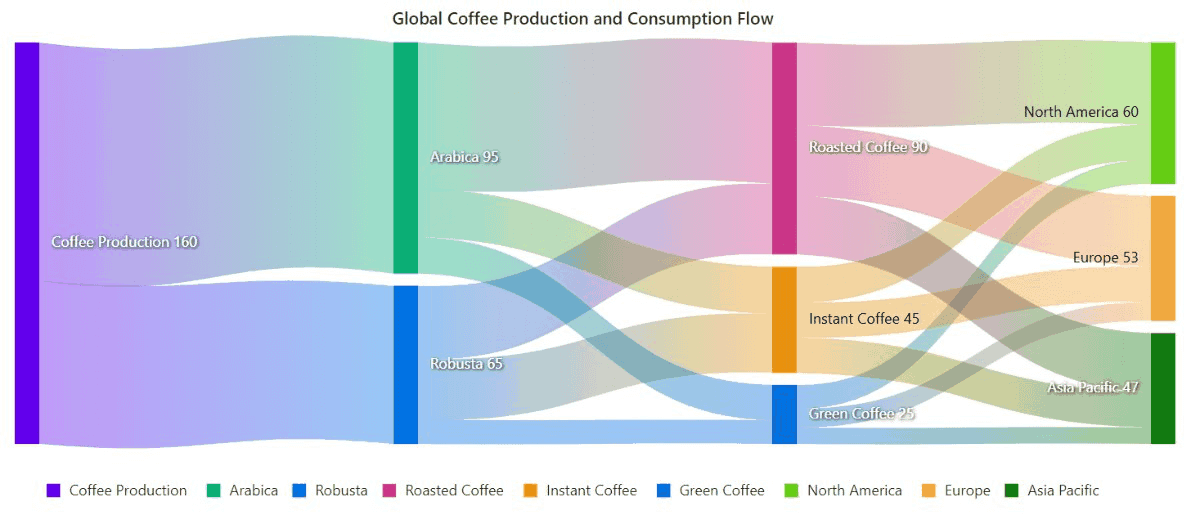How can I help you?
Getting Started with Blazor Sankey Diagram in Blazor Web App
9 Dec 202516 minutes to read
This section briefly explains about how to include Blazor Sankey diagram in your Blazor Web App using Visual Studio, Visual Studio Code, and the .NET CLI.
Prerequisites
Create a new Blazor Web App in Visual Studio
Create a Blazor Web App using Visual Studio 2022 via Microsoft Templates or the Syncfusion® Blazor Extension. For detailed instructions, refer to the Blazor Web App Getting Started documentation.
Configure the appropriate Interactive render mode and Interactivity location while creating a Blazor Web App.
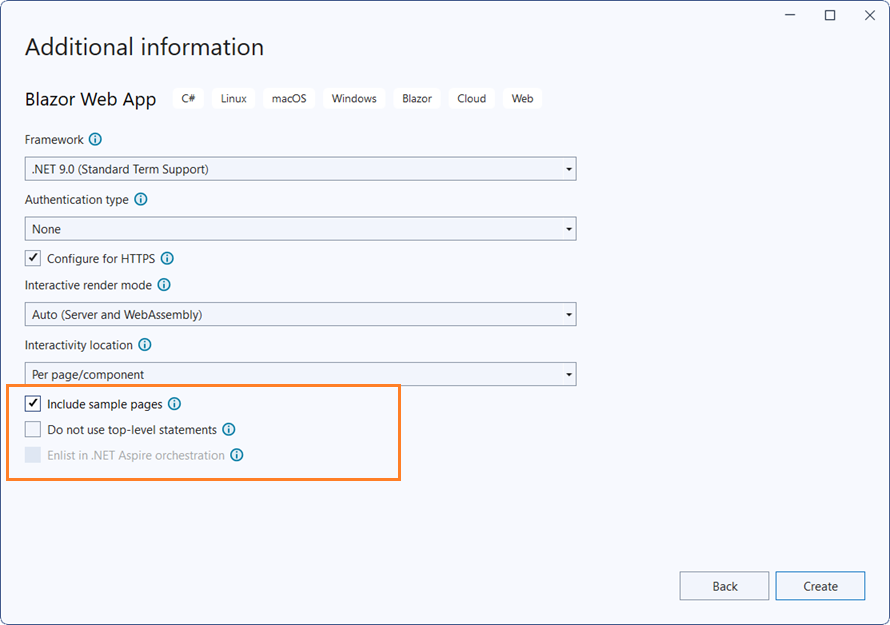
Install Syncfusion® Blazor Sankey NuGet in the App
To add the Blazor Sankey Diagram in the app, open the NuGet package manager in Visual Studio (Tools → NuGet Package Manager → Manage NuGet Packages for Solution), then search and install Syncfusion.Blazor.Sankey. Alternatively, run the following commands in the Package Manager Console.
If using the WebAssembly or Auto render modes in the Blazor Web App, install Syncfusion® Blazor components NuGet packages in the client project.
Alternatively, run the following commands in the Package Manager Console to achieve the same.
Install-Package Syncfusion.Blazor.Sankey -Version 32.2.3NOTE
Syncfusion® Blazor components are available in nuget.org. Refer to the NuGet packages topic for the available NuGet packages list with component details.
Prerequisites
Create a new Blazor Web App in Visual Studio Code
Create a Blazor Web App using Visual Studio Code via Microsoft Templates or the Syncfusion® Blazor Extension. For detailed instructions, refer to the Blazor Web App Getting Started documentation.
Configure the appropriate interactive render mode and interactivity location when setting up a Blazor Web App. For detailed information, refer to the interactive render mode documentation.
For example, to create a Blazor Web App with the Auto interactive render mode, use the following commands.
dotnet new blazor -o BlazorWebApp -int Auto
cd BlazorWebApp
cd BlazorWebApp.ClientInstall Syncfusion® Blazor Sankey NuGet in the App
If using the WebAssembly or Auto render modes in the Blazor Web App, install Syncfusion® Blazor component NuGet packages in the client project.
- Press Ctrl+` to open the integrated terminal in Visual Studio Code.
- Ensure you’re in the project root directory where your
.csprojfile is located. - Run the following command to install a Syncfusion.Blazor.Sankey NuGet package and ensure all dependencies are installed.
dotnet add package Syncfusion.Blazor.Sankey -v 32.2.3
dotnet restoreNOTE
Syncfusion® Blazor components are available in nuget.org. Refer to the NuGet packages topic for the available NuGet packages list with component details.
Prerequisites
Install the latest version of .NET SDK. If you previously installed the SDK, you can determine the installed version by executing the following command in a command prompt (Windows) or terminal (macOS) or command shell (Linux).
dotnet --versionCreate a Blazor Web App using .NET CLI
Run the following command to create a new Blazor Web App in a command prompt (Windows) or terminal (macOS) or command shell (Linux). For detailed instructions, refer to this Blazor Web App Getting Started documentation.
Configure the appropriate interactive render mode and interactivity location when setting up a Blazor Web Application. For detailed information, refer to the interactive render mode documentation.
For example, to create a Blazor Web App with the Auto interactive render mode, use the following commands:
dotnet new blazor -o BlazorApp -int Auto
cd BlazorApp
cd BlazorApp.ClientThis command creates a new Blazor Web App and places it in a new directory called BlazorApp inside your current location. See the Create a Blazor App and dotnet new CLI command topics for more details.
Install Syncfusion® Blazor Sankey NuGet in the App
Here’s an example of how to add Blazor Sankey component in the application using the following command in the command prompt (Windows) or terminal (Linux and macOS) to install a Syncfusion.Blazor.Sankey NuGet package. See Install and manage packages using the dotnet CLI topics for more details.
If using the WebAssembly or Auto render modes in the Blazor Web App, install Syncfusion® Blazor component NuGet packages in the client project.
dotnet add package Syncfusion.Blazor.Sankey --version 32.2.3
dotnet restoreNOTE
Syncfusion® Blazor components are available in nuget.org. Refer to the NuGet packages topic for the available NuGet packages list with component details.
Add Import Namespaces
Open the ~/_Imports.razor file from the client project and import the Syncfusion.Blazor and Syncfusion.Blazor.Sankey namespaces.
@using Syncfusion.Blazor
@using Syncfusion.Blazor.SankeyRegister Syncfusion® Blazor Service
Register the Syncfusion® Blazor Service in the ~/Program.cs file of your Blazor Web App.
If the Interactive Render Mode is set to WebAssembly or Auto, register the Syncfusion® Blazor service in the ~/Program.cs files of the main server project and associated .Client project.
...
...
using Syncfusion.Blazor;
var builder = WebApplication.CreateBuilder(args);
// Add services to the container.
builder.Services.AddRazorComponents()
.AddInteractiveServerComponents()
.AddInteractiveWebAssemblyComponents();
builder.Services.AddSyncfusionBlazor();
var app = builder.Build();
.......
using Syncfusion.Blazor;
var builder = WebAssemblyHostBuilder.CreateDefault(args);
builder.Services.AddSyncfusionBlazor();
await builder.Build().RunAsync();Add script resources
The script can be accessed from NuGet through Static Web Assets. Include the script reference at the end of the <body> in the ~/Components/App.razor file as shown below:
<head>
....
<script src="_content/Syncfusion.Blazor.Core/scripts/syncfusion-blazor.min.js" type="text/javascript"></script>
</head>NOTE
Check out the Adding Script Reference topic to learn different approaches for adding script references in your Blazor application.
Add Blazor Sankey Diagram
Add the Syncfusion® Blazor Sankey Diagram component to a Razor page located under the Pages folder (e.g., Pages/Home.razor) in either the Server or Client project. If an interactivity location as Per page/component in the web app, define a render mode at top of the component, as follows:
<SfSankey Nodes=@Nodes Links=@Links>
</SfSankey>
@code {
public List<SankeyDataNode> Nodes = new List<SankeyDataNode>();
public List<SankeyDataLink> Links = new List<SankeyDataLink>();
protected override void OnInitialized()
{
Nodes = new List<SankeyDataNode>()
{
new SankeyDataNode() { Id = "Coffee Production" },
new SankeyDataNode() { Id = "Arabica" },
new SankeyDataNode() { Id = "Robusta" },
new SankeyDataNode() { Id = "Roasted Coffee" },
new SankeyDataNode() { Id = "Instant Coffee" },
new SankeyDataNode() { Id = "Green Coffee" },
new SankeyDataNode() { Id = "North America" },
new SankeyDataNode() { Id = "Europe" },
new SankeyDataNode() { Id = "Asia Pacific" },
};
Links = new List<SankeyDataLink>()
{
new SankeyDataLink() { SourceId = "Coffee Production", TargetId = "Arabica", Value = 95 },
new SankeyDataLink() { SourceId = "Coffee Production", TargetId = "Robusta", Value = 65 },
new SankeyDataLink() { SourceId = "Arabica", TargetId = "Roasted Coffee", Value = 60 },
new SankeyDataLink() { SourceId = "Arabica", TargetId = "Instant Coffee", Value = 20 },
new SankeyDataLink() { SourceId = "Arabica", TargetId = "Green Coffee", Value = 15 },
new SankeyDataLink() { SourceId = "Robusta", TargetId = "Roasted Coffee", Value = 30 },
new SankeyDataLink() { SourceId = "Robusta", TargetId = "Instant Coffee", Value = 25 },
new SankeyDataLink() { SourceId = "Robusta", TargetId = "Green Coffee", Value = 10 },
new SankeyDataLink() { SourceId = "Roasted Coffee", TargetId = "North America", Value = 35 },
new SankeyDataLink() { SourceId = "Roasted Coffee", TargetId = "Europe", Value = 30 },
new SankeyDataLink() { SourceId = "Roasted Coffee", TargetId = "Asia Pacific", Value = 25 },
new SankeyDataLink() { SourceId = "Instant Coffee", TargetId = "North America", Value = 15 },
new SankeyDataLink() { SourceId = "Instant Coffee", TargetId = "Europe", Value = 15 },
new SankeyDataLink() { SourceId = "Instant Coffee", TargetId = "Asia Pacific", Value = 15 },
new SankeyDataLink() { SourceId = "Green Coffee", TargetId = "North America", Value = 10 },
new SankeyDataLink() { SourceId = "Green Coffee", TargetId = "Europe", Value = 8 },
new SankeyDataLink() { SourceId = "Green Coffee", TargetId = "Asia Pacific", Value = 7 },
};
base.OnInitialized();
}
}- Press Ctrl+F5 (Windows) or ⌘+F5 (macOS) to launch the application. This will render the Syncfusion® Blazor Sankey Diagram in the default web browser.
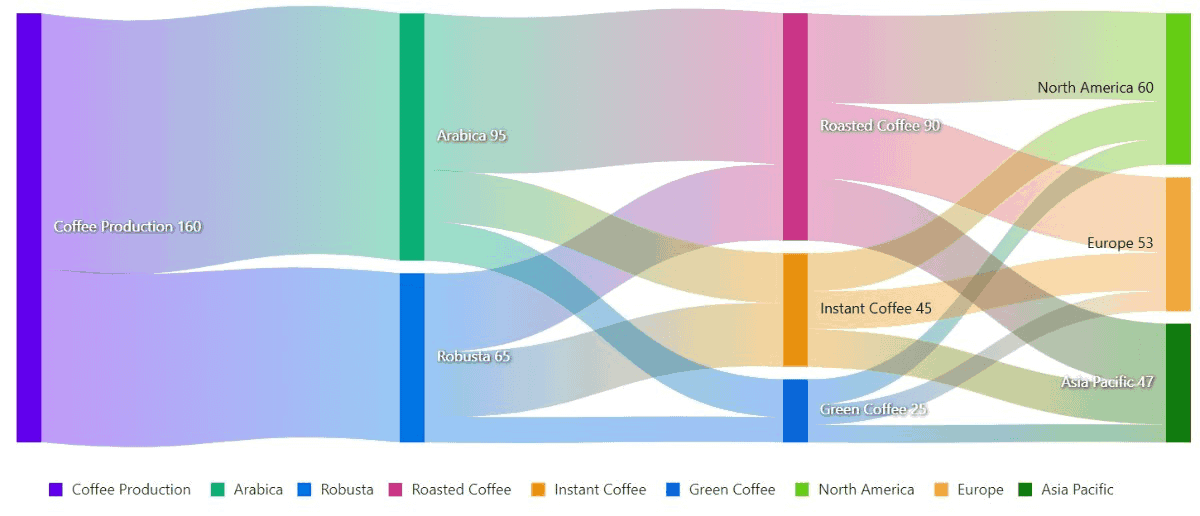
Populate Blazor Sankey Diagram with data
To bind data for the sankey diagram, you can assign an IEnumerable object to the Nodes and Links properties. These properties define the structure of the nodes and the relationships between them.
<SfSankey Nodes=@Nodes Links=@Links>
</SfSankey>
@code {
public List<SankeyDataNode> Nodes = new List<SankeyDataNode>();
public List<SankeyDataLink> Links = new List<SankeyDataLink>();
protected override void OnInitialized()
{
Nodes = new List<SankeyDataNode>()
{
new SankeyDataNode() { Id = "Coffee Production" },
new SankeyDataNode() { Id = "Arabica" },
new SankeyDataNode() { Id = "Robusta" },
new SankeyDataNode() { Id = "Roasted Coffee" },
new SankeyDataNode() { Id = "Instant Coffee" },
new SankeyDataNode() { Id = "Green Coffee" },
new SankeyDataNode() { Id = "North America" },
new SankeyDataNode() { Id = "Europe" },
new SankeyDataNode() { Id = "Asia Pacific" },
};
Links = new List<SankeyDataLink>()
{
new SankeyDataLink() { SourceId = "Coffee Production", TargetId = "Arabica", Value = 95 },
new SankeyDataLink() { SourceId = "Coffee Production", TargetId = "Robusta", Value = 65 },
new SankeyDataLink() { SourceId = "Arabica", TargetId = "Roasted Coffee", Value = 60 },
new SankeyDataLink() { SourceId = "Arabica", TargetId = "Instant Coffee", Value = 20 },
new SankeyDataLink() { SourceId = "Arabica", TargetId = "Green Coffee", Value = 15 },
new SankeyDataLink() { SourceId = "Robusta", TargetId = "Roasted Coffee", Value = 30 },
new SankeyDataLink() { SourceId = "Robusta", TargetId = "Instant Coffee", Value = 25 },
new SankeyDataLink() { SourceId = "Robusta", TargetId = "Green Coffee", Value = 10 },
new SankeyDataLink() { SourceId = "Roasted Coffee", TargetId = "North America", Value = 35 },
new SankeyDataLink() { SourceId = "Roasted Coffee", TargetId = "Europe", Value = 30 },
new SankeyDataLink() { SourceId = "Roasted Coffee", TargetId = "Asia Pacific", Value = 25 },
new SankeyDataLink() { SourceId = "Instant Coffee", TargetId = "North America", Value = 15 },
new SankeyDataLink() { SourceId = "Instant Coffee", TargetId = "Europe", Value = 15 },
new SankeyDataLink() { SourceId = "Instant Coffee", TargetId = "Asia Pacific", Value = 15 },
new SankeyDataLink() { SourceId = "Green Coffee", TargetId = "North America", Value = 10 },
new SankeyDataLink() { SourceId = "Green Coffee", TargetId = "Europe", Value = 8 },
new SankeyDataLink() { SourceId = "Green Coffee", TargetId = "Asia Pacific", Value = 7 },
};
base.OnInitialized();
}
}Add title
Using the Title property, you can add a title to the sankey diagram to provide the user with quick information about the data plotted in the sankey diagram.
<SfSankey Title="Global Coffee Production and Consumption Flow" Nodes=@Nodes Links=@Links>
</SfSankey>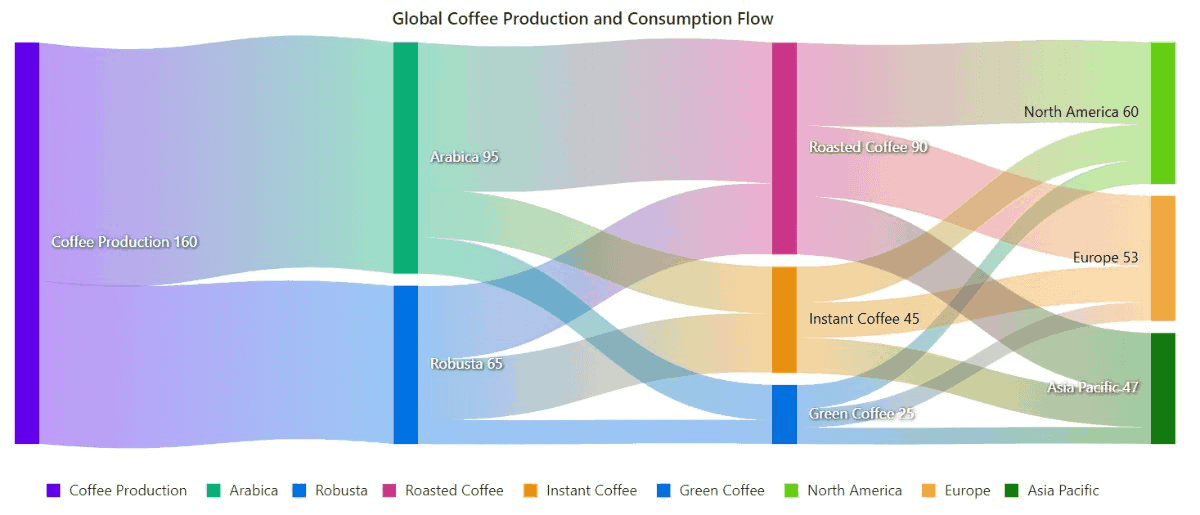
Add node labels
You can add data labels to improve the readability of the sankey diagram. This can be achieved by setting the Visible property to true in the SankeyLabelSettings.
<SfSankey Title="Global Coffee Production and Consumption Flow" Nodes=@Nodes Links=@Links>
<SankeyLabelSettings Visible="true"></SankeyLabelSettings>
</SfSankey>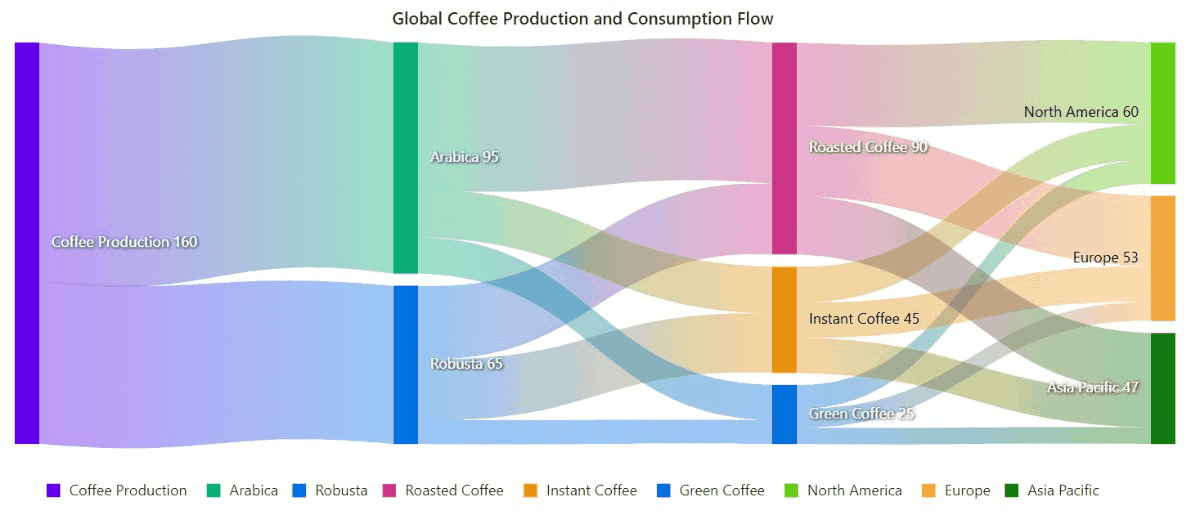
Enable tooltip
The tooltip can be enabled by setting the Enable property in SankeyTooltipSettings to true. However, the tooltip is enabled by default in the sankey diagram.
<SfSankey Title="Global Coffee Production and Consumption Flow" Nodes=@Nodes Links=@Links>
<SankeyTooltipSettings Enable="true"></SankeyTooltipSettings>
</SfSankey>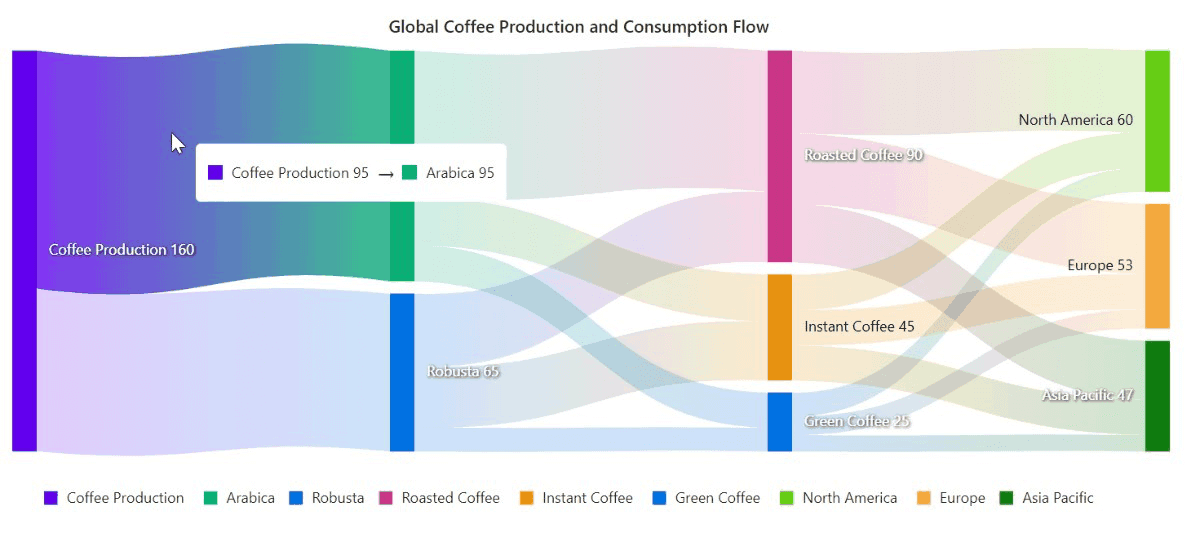
Enable legend
You can use legend for the sankey diagram by setting the Visible property to true in SankeyLegendSettings. However, the legend is enabled by default in the sankey diagram.
<SfSankey Title="Global Coffee Production and Consumption Flow" Nodes=@Nodes Links=@Links>
<SankeyLegendSettings Visible="true"></SankeyLegendSettings>
</SfSankey>